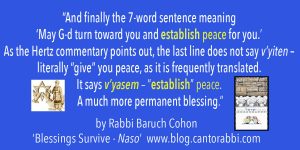BLESSINGS SURVIVE – Naso – Num. 4:21—7, by Rabbi Baruch Cohon
Our reading this week recounts no less than five ancient practices that we no longer observe, no matter how pious we may be otherwise.
No longer do the Levi tribesmen carry the sacred objects – the holy Ark, the altar, etc. – on their shoulders from campsite to campsite. That duty applied only until they reached the Promised Land.
People who get ritually contaminated, as by contact with a dead body, are not quarantined outside the community. They can go to a Mikveh and bathe.
The Ordeal of Jealousy – including the singular “Sotah water” process – was discontinued many centuries ago.
Nazirites who dedicated their lives even temporarily to Divine service had to forego haircuts, alcoholic beverages and any ritual contamination, with some detailed instructions for handling whatever problems might interfere, as long as they remained Nazirites. This entire practice ceased with the destruction of the Temple.
And the identical offerings of the princes on dedicating the altar, while their details can still teach us a lesson in the equality of ritual responsibility, took place just once.
The exception to this list comes in Chapter 6, with a simple instruction to Moses: “Speak to Aaron and his sons, saying: Thus shall you bless the people of Israel.” And it dictates the famous three lines that appear in everyday synagogue services, and at every Jewish wedding, to this day. First, the 3-word sentence, translated “May G-d bless you and keep you.” What does “keep you” mean here? Our commentators interpret it as referring to whatever we may own. This is a physical blessing: Bless us with possessions, and make us safe from robbers. Certainly as valuable a blessing today as it ever was. Second comes the 5-word sentence meaning “May G-d shine the light of His presence on you and favor you.” This, say our commentators, is a spiritual blessing. The Midrash expands it to say “May G-d make your eyes bright with Divine light; let prophetic light brighten the souls of your children, and let the light of Torah illuminate your home.” And finally the 7-word sentence meaning “May G-d turn toward you and establish peace for you.” As the Hertz commentary points out, the last line does not say v’yiten – literally “give” you peace, as it is frequently translated. It says v’yasem – “establish” peace. A much more permanent blessing.
As a cohen, I have the hereditary responsibility to join other cohanim in pronouncing this blessing in the synagogue on festivals, and it is a privilege that resounds in our ears when we hear the congregation chanting Amen after each line – or in many synagogues Ken y’hi ratzon: “So may it be G-d’s will.” And when we do this dukhenen as it is called, we should always remember the very next sentence in this Torah reading: “They will put My name on the people of Israel and I will bless them.” We cohanim serve as mere agents, delivery men as it were. We do not originate the blessing, because it comes from the Almighty. In fact, the Chabad prayerbook includes a significant paragraph for each cohen to say privately after the ceremony, affirming “we have done what You decreed for us. Now deal with us as You promised. Look down from Your heavenly abode and bless Your people Israel….”
So may it be.




Thank you for your beautiful explanation of a very familiar blessing.
Yes….v’yasem. Let us pray soon.